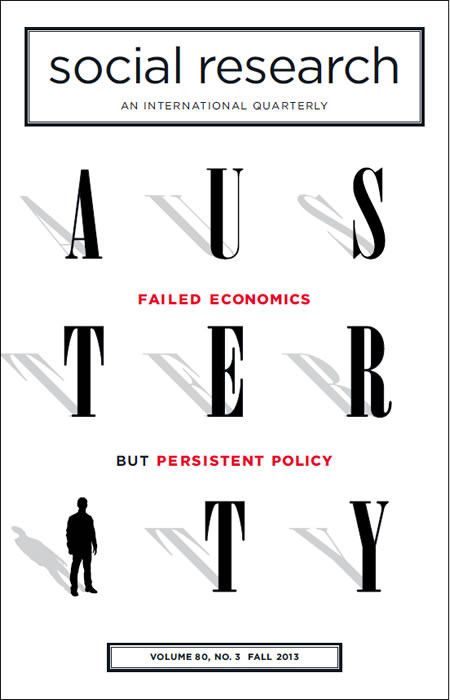|
NEW YORK, November 4, 2013 - Following a debilitating federal shutdown that failed to resolve conflicts over government spending and economic recovery, New School economists and others join together in an upcoming journal publication to critique the mainstream acceptance of austerity policies that persist politically despite continued economic stagnation.
“Austerity: Failed Economics But Persistent Policy,” is the Fall 2013 issue of Social Research: An International Quarterly, a publication produced by The New School’s Center for Public Scholarship. The volume includes thirteen essays by leading economists, including Teresa Ghilarducci, Robert Pollin, Rick McGahey, and Willi Semmler, offering tools to escape austerity’s ill-advised vision and concrete policies to create economic growth and prosperity for all people, rather than just a wealthy few.
The volume describes austerity policies both here and abroad, how implementation has restricted economic growth, and why government officials continue to support these policies in spite of their poor track record.
Specifically, authors argue that austerity policies hamper economic recovery but remain popular among elites as a tool to lower labor costs and taxes while increasing profits. A real path to economic recovery and long-term fiscal health requires refocusing the debate from how to eliminate debt to how to eliminate mass unemployment.
Alternative policy proposals include a federal loan guarantee program for small businesses (Pollin), creation of a permanent federal government job guarantee program (Hamilton), and an expansion of Social Security to stabilize the economy and bolster the bargaining power of labor (Ghilarducci). Below is a brief description of these four articles. To schedule interviews with these experts, contact Sam Biederman at [email protected].
Teresa Ghilarducci, labor economist and chair of the economics department at The New School for Social Research
“Austerity Distorts the Common Economic Interests between Generations”
This article refutes the idea that social spending on the elderly hurts young people. A key argument of some austerity advocates is that retirement and health care spending takes funding away from investments supporting education and youth development. Ghilarducci shows that support for spending on the elderly and the young are complements rather than substitutes, and that austerity advocates use these arguments to divide the interests and political strength of working families.
Robert Pollin, professor of economics at the University of Massachusetts Amherst and founding co-director of its Political Economy Research Institute
“Austerity Economics and the Struggle for the Soul of US Capitalism”
Pollin debunks the austerity frame that the economy is threatened by uncontrolled public debt by documenting that the public debt burden in the U.S. is at a near-historic low. He presents evidence that austerity policies do not promote economic recovery, but remain popular among elites as a tool to lower labor costs and taxes. Pollin lays out an agenda to refocus the debate on how to eliminate mass unemployment. In the short-term, he proposes two concurrent means of releasing into the economy the $1 trillion in excess cash reserves that banks are holding: expanding government loan guarantees to job-generating small businesses while taxing bank reserves above a certain threshold. In the long-term, he calls for switching spending from the fossil fuel and military sectors to sectors with more potential to create jobs - education and green energy.
Rick McGahey, labor economist and director of the Environmental Policy and Sustainability Management program at The New School
“The Political Economy of Austerity in the United States”
Delving into issues surrounding the recent government shutdown and ongoing congressional gridlock, McGahey describes the political and economic history that has led to present-day austerity policies in the United States. He explains that austerity still holds sway despite documented intellectual and policy failures due to a Republican ideology aimed at shrinking the size of government. In short, the party has been willing to accept growth in the national debt – under the rubric of refusing new revenues - as a means to cripple the government’s long-term ability to expand social programs.
Willi Semmler, Henry H. Arnhold Professor of International Cooperation and Development in the Department of Economics at The New School for Social Research
“The Macroeconomics of Austerity in the European Union”
This article analyzes the EU’s austerity program. Semmler shows that in periods of high financial stress and recession the fiscal consolidation intended to stabilize debt is costly in terms of harming growth—in short, the cure is worse than the disease, and in fact contributes to it. Understanding the real macroeconomics of European austerity reveals its analytic weaknesses and why it is a poor guide for policy.
About Social Research: An International Quarterly
An award-winning journal, Social Research has been mapping the landscape of intellectual thought since 1934. Most issues are theme-driven, combining historical analysis, theoretical explanation, and reportage in rigorous and engaging discussion by some of the world's leading scholars and thinkers. Articles cover various fields of the social sciences and the humanities and thus promote the interdisciplinary aims that have characterized The New School for Social Research since its inception. Recent issues have focused on such themes as "Happiness," "Migration Politics," and "The Religious-Secular Divide." The Social Research conference series was launched in 1988 and aims to enhance public understanding of critical and contested issues by exploring them in broad historical and cultural contexts. For more information, visit www.newschool.edu/cps.
About the Center for Public Scholarship
The Center for Public Scholarship aims to bring the best scholarship and expertise to bear on current, pressing social issues in a way that makes the scholarship accessible to the public and simultaneously deepens understanding of what may be at stake and how to proceed. It seeks to become a catalyst for events that draw on the humanities, social sciences, design, and public policy and have the potential of accomplishing our mission, namely, enhancing the public's understanding of the significant issues of our time. The Center is dedicated to promoting academic freedom and freedom of inquiry, goals that are rooted in the earliest history and ideals of The New School.
About The New School
Founded in 1919, The New School was born out of principles of academic freedom, tolerance, and experimentation. Committed to social engagement, The New School today remains in the vanguard of innovation in higher education, with more than 10,000 undergraduate and graduate students challenging the status quo in design and the social sciences, liberal arts, management, the arts, and media. The New School welcomes thousands of adult learners annually for continuing education courses and calendar of lectures, screenings, readings, and concerts. Through its online learning portals, research institutes, and international partnerships, The New School maintains a global presence. Learn more at www.newschool.edu.
###
|

